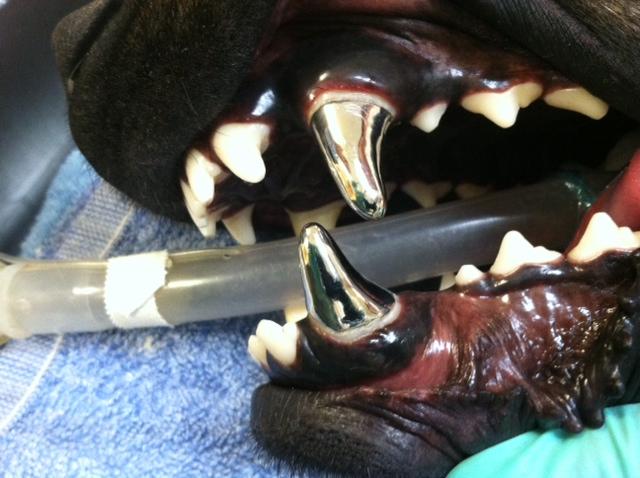
26 Feb Dental Crown Therapy for Dogs
Dental Crown Therapy for Dogs in Castle Rock and Colorado Springs, CO
Dogs frequently fracture teeth. Studies have shown that up to 10% of dogs have some type of fractured tooth. All fractured teeth should be evaluated by a veterinarian and be imaged with a dental radiograph. If the fracture does not expose the tooth’s pulp and the radiograph is normal, it can be treated with a procedure that smooths the fracture and seals the exposed dentin. This kind of procedure will decrease any possible pain and inhibit infection.
However, many fractured teeth have pulp exposure and should be treated with either root canal therapy or surgical extraction. Due to their functional role in chewing, a root canal treatment is most often performed on strategically important teeth, such as the canines (fangs), carnassial and third maxillary incisors. Read our recent blog post on root canal therapy in dogs and cats for more information.
Dental Crown Therapy for Dogs Can Restore Tooth Function
Fractured teeth are often weakened due to a loss of tooth structure and function. Root canal therapy does not necessarily weaken the tooth further, but it will leave the tooth somewhat more prone to re-fracture in many situations. Treating a dog’s fractured tooth with a prosthetic metal crown will restore much, if not all, of its lost function. Also, a fractured tooth with a metal crown will be far stronger and less likely to fracture again compared to a tooth that has only been treated with root canal therapy.
It should be noted that we do not create crowns for our canine patients for aesthetic purposes. A dog does not care how a tooth may look. They care how it feels and that it is not painful. That is our focus.
What is the Procedure for Dental Crown Therapy?
Metal crown creation and placement requires two anesthetic procedures. During the first procedure, the tooth is treated with root canal therapy and prepped for a metal crown. Detailed impressions are created of the tooth and submitted to an outside laboratory that specializes in creating the crown. These crowns are most often made of metal alloys, such as nickel and chromium.
The fabricated metal crown is returned within 7-10 days and the patient is scheduled for a brief second procedure. During this procedure, the crown is first placed on the tooth to be sure it fits well and that there is no interference with surrounding teeth. It is then cemented in place through a series of detailed steps.
Dental Crown Therapy at Our Offices Has an Extremely High Success Rate!
Appropriately fabricated and cemented crowns rarely fail and should last the lifetime of a dog. In the course of my career, I have performed hundreds of crown preparations and cementations. I have had one cement failure in a working police dog. Fortunately, I was able to cement the crown back in place and the dog was able to return to service the following day.
I find metal crown creation an exceedingly rewarding treatment option for our canine patients. We are able to remove the source of pain and infection in a fractured tooth through root canal therapy and restore the lost structure and function of the tooth with the placement of a metal crown. This way, the dog does not have to experience the stress of a surgical extraction and is able to keep a critical member of its dentition along with its original structure and function.
If you have any questions about possible root canal therapy and metal crown creation for your dog, please visit our website or call us at (719) 536-9949.

